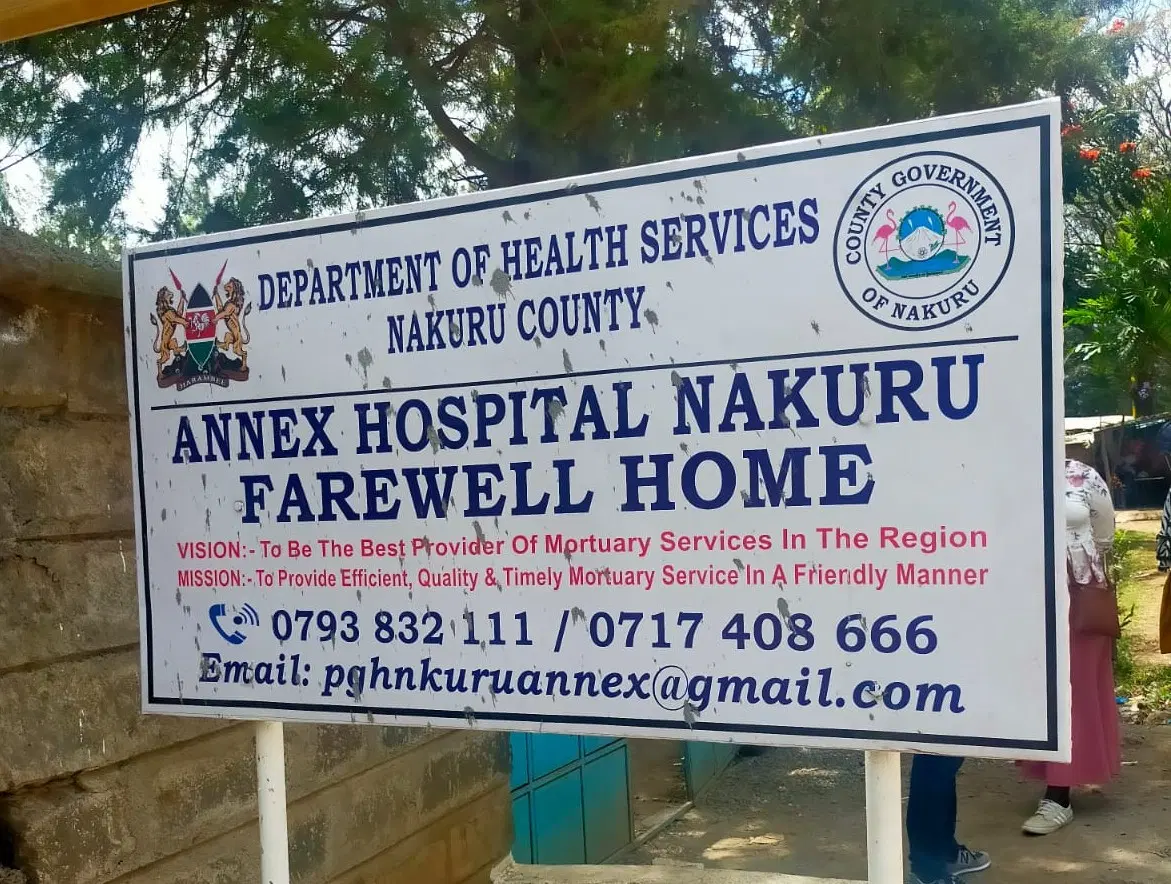
 One of the hospitals whose services have been overstretched due to many unclaimed bodies preserved in its morgue./KNA
One of the hospitals whose services have been overstretched due to many unclaimed bodies preserved in its morgue./KNA
Nakuru County has issued a 21 days’ public notice to dispose of 59 bodies that have remained unclaimed for the last three months in public morgues in two major hospitals in the County.
The devolved unit has further released a list of the unclaimed bodies, indicating the exact place of death and date as well as the cause of the death.
The notice issued by County Public Health Officers, Beatrice Oyiengo and Rachael Mwangi indicated that the bodies that presently lie at the County Referral and Teaching Hospital Mortuary and Annex PGH Public Mortuary had been unclaimed for over three months, affecting service delivery at the facilities.
"The following 15 adults and 22 infants unclaimed bodies are at the Public Mortuary (Annex PGH) and a further 22 adult bodies at Nakuru Teaching and Referral Hospital Mortuary from the state of admission. Interested members of the public are asked to identify and collect the bodies within twenty-one days, failure to which Nakuru County will seek authority for disposal," the public notice indicated.
According to the list released by the public health officers, some of the unclaimed bodies had identities by the time of collection, while others did not, thus remaining unknown.
The report also indicated that some of the corpses marked as unknown were recovered by police without any form of identification documentation.
The statement released also revealed that the causes of death for the deceased are road accidents, murder, drowning, shooting, natural death, sudden death, abortion, and mob injustice. Few cases have been indicated to be that of natural death.
The public health officers said a court order will be first sought so as to allow them to dispose of the corpses if no one will have claimed them, in pursuant to the Public Health Act Cap 242 [Subsidiary; public health (public mortuaries) rules, 1991].
Ms Oyiengo stated that the two facilities have exhausted all the available mechanisms to trace their next of kin without success and that continued storage of the bodies was causing inconveniences to the service delivery.
“If next of kin are not traced, the disposal will be done after the expiry of twenty-one (21) days from the date of this letter at the Nakuru South Cemetery,” the notice read in part.
After every few months, mortuaries run public notices of the disposal of bodies. Upon expiry of the notice, the bodies are buried in public cemeteries or in mass graves without the knowledge of their loved ones. Unfortunately, the bodies are buried with no rites.
The disposal is carried out to create room and to avoid overstretching the facilities where the bodies are preserved.
The Public Health Act (Cap 242) mortuary rule stipulates that no person shall keep the dead in a morgue for more than 10 days. If a body remains unclaimed for 21 days, the hospital is allowed to dispose of it as long as they have court orders and have given a 14-day public notice.
Every year 200 to 300 unclaimed bodies lie in Nakuru County morgues. Some of the reasons why families fail to claim their deceased relatives' remains include lack of money to bury them, cultural myths and lack of land for burial.
According to the Public Health Act 242, (Public Mortuaries) any person who keeps the dead in a public morgue for more than 10 days shall pay to the Medical Officer of Health a penalty of one hundred shillings for each day the body remains uncollected.
Medical schools with legal backing and permission from the Ministry of Health are allowed by the Anatomy Act Cap 249 to obtain unclaimed bodies for medical studies.
According to a counseling psychologist, Ochieng Okuku, the reason there are many unclaimed bodies is that most families don’t know that their loved ones have died and added that most unclaimed bodies are mostly of unknown people whose causes of death are unnatural.
“It is difficult to track down families of victims who die unnatural deaths and the police cannot identify the fingerprints of the deceased,” he said.
Police play a critical role in identifying fingerprints of the deceased.
A criminal investigation expert explained that a postmortem is conducted by a coroner after the family is made aware, after which they can claim the body.
A coroner is a qualified person whose duty is to investigate the cause of any death occurring due to a non-natural cause.
Investigation of sudden and unexplained death takes many forms. In Kenya this has mostly been through a public inquest established under Sections 385-387 of the Criminal Procedure Code.
In 2017, Parliament enacted the National Coroners’ Service Act, providing the framework for the investigation of reported deaths.
But implementation of the National Coroners Service Act, 2017 has been delayed by a legal bottleneck over which cabinet secretary should name the coroner-general and determine the terms of the Coroners’ Service.
The Act transferred the investigation of unnatural and violent deaths, including those in police custody and prison, from the police to the coroner-general, an independent office whose occupant is competitively appointed by the cabinet secretary responsible for matters relating to justice upon recommendation by the Public Service Commission.











